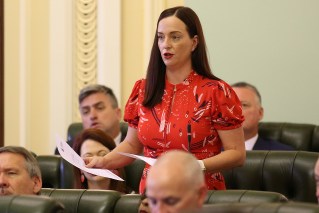The United Nations secretary-general says Australia and other countries intent on increasing fossil fuel production are dangerous radicals.
António Guterres made the comment while launching a new global climate change report urging the world to hit the accelerator on the transition to renewable energy.
The Intergovernmental Panel on Climate Change report, released on Tuesday (AEST), says it’s still possible to meet the objectives of the Paris climate pact to limit global warming to well below 2C, preferably to 1.5C.
It sets out viable, financially sound options to keep the 1.5C goal alive, with Mr Guterres saying the pace of transition to renewables needs to triple.
“We are on a pathway to global warming of more than double the 1.5-degree limit agreed in Paris. Some government and business leaders are saying one thing — but doing another. Simply put, they are lying,” he said.
He said climate activists were sometimes depicted as dangerous radicals “but the truly dangerous radicals are the countries that are increasing the production of fossil fuels”.
- Related story: The IPCC says the tools to stop catastrophic climate change are in our hands. Here’s how to use them.
Mr Guterres blasted politicians and businesses in the wake of a grave climate crisis assessment.
“It is a file of shame, cataloguing the empty pledges that put us firmly on track towards an unliveable world,” he said.
“Climate activists are sometimes depicted as dangerous radicals. But the truly dangerous radicals are the countries that are increasing the production of fossil fuels. Investing in new fossil fuels infrastructure is moral and economic madness,” he continued.
Addressing the world’s population, he said: “Demand that renewable energy is introduced now — at speed and at scale.”
The IPCC report said actions such as drastically cutting fossil fuel use, growing forests and eating less meat were needed to contain global warming to 1.5C above pre-industrial temperatures.
Despite climate change warnings issued by the Intergovernmental Panel on Climate Change (IPCC) since 1990, global emissions have continued to rise in the last decade, reaching their highest point in history.
The result: global emissions are on track to blow past the 1.5C warming limit envisioned in the 2015 Paris Agreement and reach some 3.2C by century’s end.
“We left COP26 in Glasgow with a naive optimism, based on new promises and commitments,” Mr Guterres said.
“But current climate pledges would (still) mean a 14 per cent increase in emissions. And most major emitters are not taking the steps needed to fulfil even these inadequate promises.”
At this point, only severe emissions cuts in this decade across all sectors, from agriculture and transport to energy and buildings, can turn things around, the report says.
Even then, governments would also need to bolster efforts to plant more trees and develop technologies that could remove some of the carbon dioxide already in the atmosphere after more than a century of industrial activity.
“It’s now or never,” IPCC report co-chair Jim Skea said in a statement with the report – the last in a three-part series by the IPCC, with the next review cycle not expected for at least another five years.
While other recent IPCC reports addressed the latest findings in climate change science as well as ways for the world to adapt to a warmer world, Monday’s tackled ways of curbing emissions – making it one of the more contentious reports of the pack for governments.
Some scientists described the process as “excruciating,” and the IPCC was forced to delay the report’s public release by six hours on Monday.
Final approval of the report’s key summary for policymakers — which requires sign-off from all countries — followed a marathon weekend overtime session as government officials quibbled over the wording.
“Different countries have different interests,” IPCC co-author and climate scientist Jan Minx.
“Everyone wants to make sure that their concerns are addressed … but scientists have the last word.”
Australia’s ‘patchwork’ of climate policies
Frank Jotzo is a professor of climate change economics at the Australian National University and a lead author on the report, which focuses on what must be done globally to avert the worst consequences of climate change.
He said Australia had a patchwork of climate policies that only covered a small part of the economy — nothing like the wholistic approach the report said was needed to be effective.
“In addition, the level of ambition in the few climate policy instruments that are in operation is very weak, compared to what is needed to be on a trajectory compatible with a 2C outcome,” he said.
He said there was little in place to encourage the transport sector to move away from fossil fuels, building codes were lax on energy efficiency, and the federal government’s safeguard mechanism, meant to apply enforceable emissions baselines for heavy emitters, was ineffective.
“There is no effective incentive to reduce emissions because baselines are set so high that most companies are below them anyway, without having to do anything.”
Peter Newman is a professor of sustainability from Curtin University and a co-author of the IPCC report, with a focus on transport.
He said Australia and other countries intent on supporting fossil fuel industries were trying to subvert the market-led transition to renewables.
“And that is really silly. Even in countries that politically are considered hold-outs or laggards we are seeing this kind of market-led transformation,” he said.
The report details the dramatic drop in the affordability of renewable power since 2010: solar is down 87 per cent, wind, 55 per cent, and batteries 85 per cent.
“We now have a cost effective set of solutions that can provide dramatic reductions. An exponential decline in fossil fuels is now on the cards because they are market ready, they are cost effective,” he said.
“We can make the changes now, working with the economy, and not against it. That’s a dramatic shift in what we are seeing in this IPCC report.”
Prime Minister Scott Morrison went to a major climate summit in Glasgow last year without the two big things countries were asked for: stronger 2030 emissions reduction targets, and a rapid phase out of coal.
Mr Morrison’s plan to achieve net zero emissions by 2050 relies on a technology-led economic evolution to cut emissions, capture and store them, or offset them, while allowing coal and gas exports to continue as long as there is demand.
New coal mining projects continue to be approved, along with gas developments.
-AAP








